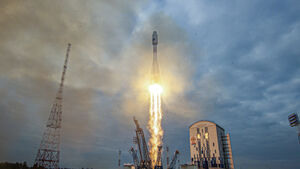The first lunar mission in the history of modern Russia took off from the Vostochny launch facility in Russia’s Far East on Friday, as a TASS correspondent reported from the space centre.
The Fregat booster separated from the rocket’s third stage approximately 564 seconds into the flight. The Luna-25 spacecraft will separate from the booster about an hour after the launch.
The flight to the Moon will take up to 5.5 days.
The spacecraft will spend between three and seven days about 100 km above the lunar surface before touching down in the area of the Boguslawsky crater. Manzinus and Pentland-A craters have been named as alternative landing sites.
The mission’s key goal will be to polish the soft landing technology. The mission may become the first spacecraft ever to land near the South Pole of the Earth’s natural satellite. The spacecraft will look for natural resources, including water, and study the effects of space rays and electromagnetic emissions on the lunar surface.
The lander is equipped with several cameras. They will make timelapse footage of the landing and an HDR wide-angle image of the moonscape. Luna-25 will turn its cameras on during pre-programmed periods and on a signal from the Earth.





